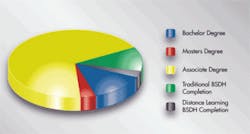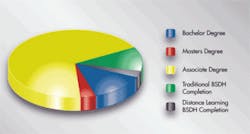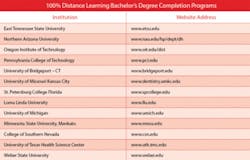Bachelor's Degree Programs: Finding the Right Fit
Fortunately, the growth of distance learning has allowed institutions to design quality curriculum that attract nontraditional students.
There is increasing national interest in the pursuit of advanced degrees consistent with escalating advances in information and technology. Working dental hygienists who are interested in pursuing advanced degrees face the difficulty of balancing work and family obligations with traditional educational programs.
One major reason hygienists may want to pursue an advanced degree is the nature of dental hygiene education. There are currently 293 entry-level dental hygiene programs in the United States (ADHA, 2007), which are predominantly two-year community college-based associate's in science (AS) degree programs (Table 1). Although an AS degree meets licensing requirements, an advanced degree opens career opportunities in education, public health, and the corporate arena. In addition, clinical hygienists gain supplementary skills that will enhance their knowledge and have a positive impact on the oral health of their patients. Continued education also offers the opportunity to expand knowledge in a profession that, through technology, is changing at a rapid pace, according to Mitchell, Gadbury-Amyot, Bray, and Simer-Beck (2007).
Fortunately, the growth of distance learning has allowed institutions to design quality curriculum that attract nontraditional students. These students may reside far from the parent institution or may be juggling career and family obligations (Grimes, 2002). This flexible learning style enables licensed dental hygienists to pursue a higher degree in their profession. This article will present information on the distance learning bachelor's degree dental hygiene programs.
• Bachelor's degree completion — There are currently 58 bachelor's degree programs available to licensed dental hygienists who hold an associate's in science degree in dental hygiene (ASDH) or a certificate in dental hygiene, and a dental hygiene state license (CDHA, 2007). Because the ASDH requires extensive coursework with a strong emphasis on didactic courses, educational institutions that have incorporated degree programs generally provide credit to associate's in science dental hygiene courses to minimize the time and units required to achieve a bachelor's in science degree.
The traditional bachelor's degree in dental hygiene (BSDH) programs in the United States offer limited access, and actively employed clinical hygienists may find it difficult to attend a traditional education setting. Studies have established the effectiveness of distance education when compared to on-site education in varied models (Grimes, 2002), and the growing number of distance-learning BSDH programs accommodate working professionals and encourage an advanced degree. Currently, 27 BSDH programs offer a percentage of web-based coursework, and 14 programs that are 100 percent distance-learning are available (ADHA, 2007).
• Technology Requirements — A dental hygienist entering a distance learning degree program should know the strengths and weaknesses of this experience. While the curriculum narrowly focuses on the direct applications to dental hygiene, there are technology requirements. Candidates must evaluate the equipment costs and have access to and knowledge of the Internet (Grimes, 2002).
• Formats — The most obvious benefit of distance learning includes flexibility in the hours and learning environment. All courses taught through distance learning have scheduling requirements, which potential students should investigate when considering a program. Some programs follow a traditional quarter or semester schedule, while others progress through modified six to eight week course segments. This shorter schedule requires students to focus on a single course through its completion. Typically, these courses are designed to require eight to 10 hours each week.
All distance-learning formats have participation requirements designed to provoke thought and communication among classmates and increase interaction with the professor. These requirements are met by responding to online posting boards. Professors will typically present case scenarios or ask course-related questions of the group. Each member responds to the professor and classmates.
• Admissions — The basic requirements and credentials for admission are similar for all distance-learning programs but should be closely reviewed. All BSDH programs require graduation from an accredited institution with an associate's in science degree in dental hygiene (ASDH) and state licensure. Additional requirements may include a specific minimum cumulative college GPA, one to three years experience as a licensed clinician, an interview, references, and application fees. An unexpected complication to admission may be transferring general education credits to an out-of-state institution. It is recommended that potential students talk with the institution's counselor prior to application about the transfer of existing general education courses.
• Graduation Requirements — Graduation is based on meeting the admission requirements and completing the designated coursework. Most degree programs currently require 30 to 44 units of coursework within 24 months. Some institutions have part-time schedules. If the state of the institution has a dental hygiene license requirement for the delivery of local anesthesia, then all graduating students must meet this requirement. If the state dental hygiene license does not include local anesthesia, students will be required to complete appropriate coursework in this area. Additionally, some programs have specific math and foreign language requirements.
• Costs — Public and private universities in the U.S. are generally regarded as having similar academic standards, but price may be considerably different. Public institutions can generally offer lower tuition, but as education costs continue to rise, some private institutions have large endowments that enable them to offer more scholarship opportunities than their public counterparts. The cost of a program will depend on the institution's cost per unit and the number of units required. It is usually financially advantageous for the student to continue in his or her resident state. In addition to the cost per unit, there may be technical and course fees. Required textbooks are an additional cost.
Educational institutions are adapting to meet the needs of working professionals. A variety of distance-learning options are available to earn a bachelor's degree in dental hygiene that include 100 percent online and partially online courses. There are also part-time programs.
A key factor in successfully completing educational goals will be to choose the right program. The challenge for many professionals is getting started. Once you have identified your personal goals, it is beneficial to gather information through the university Web sites. (Table 2) Consider reaching out to graduates or employers who have hired graduates for comments. Visit the campus if possible, and be sure to talk with the program director to clarify any concerns before finalizing your decision. Pursuing a bachelor's degree requires significant financial investment and emotional commitment. Taking time to research your decision and find the program that best fits your lifestyle will increase your opportunity for success.
About the Author
Ann Bruck, RDH, BS, received an associate's of science degree from West Los Angeles College in 2003. She received her bachelor of applied science degree in dental hygiene from St. Petersburg College in May 2008. She has been a clinical dental hygienist for five years at the UCLA Faculty Group Dental Practice, contributes as a part-time lecturer at the UCLA School of Dentistry, and travels throughout California and Arizona as a dental educator for Sunstar Americas, Inc., speaking to dental hygiene students and faculty. She is a member of ADEA, ADHA, CDHA and the South Bay Dental Hygienists Society. She may be contacted at [email protected].
Is Online Learning For You?
Distance learining is not for everyone. It should not be assumed that this form of education is easier. Courses are often defined from the start with an online organizer and due dates. There is no time for procrastination. Most work is done on a computer and interaction with classmates and professors is online. Commitment to continued education and self-motivation are necessare to successfully achieve a degree through distance education.
Ask Yourself:
- Will I be successful with all assignments being in written language only?
- Will I be able to work independently?
- Will I be self-motivated?
- Will I be successful without the social element of a traditional classroom?
- Will I be comfortable with little or no face-to-face contact with instructors?
- Do I have the proper computer equipment and Internet access required?
- Do I know how to use a computer and access the Internet?
- Can I adapt my daily schedule to include my studies?
- Do I have the support of family to allow quiet study time without interruption?
Checklist To Identify The Right Fit
- Visit school Web sites Check the course calendars
- Verify the admissions requirements
- Confirm the transfer of prior coursework
- Compare the tuition and fees
- Explore financial aid opportunities
- Consider the location of the institution
- Inquire about class size and ratio of students to each professor
- Investigate the reputation of the program and placement rate of graduates
- Look at the quality of the curriculum and its relevance to employment goals
- Ask about the quality of technical services and helpdesk hours of availability
- Evaluate the online library resources


